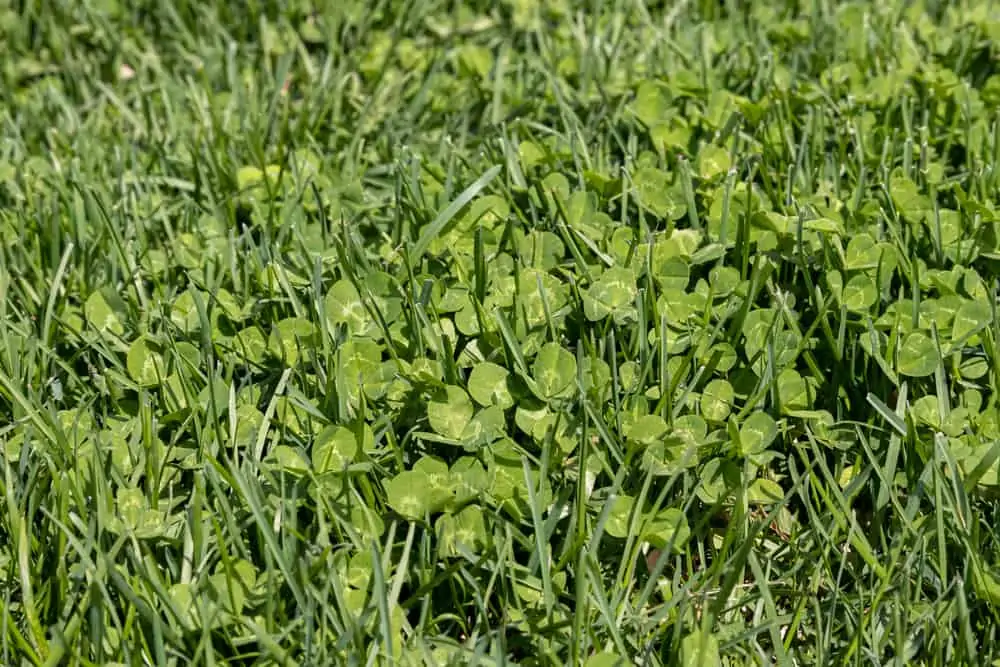There is not much worse, in terms of horticulture than seeing your beloved lawn become infested with clover.
Different types, such as white clover, regularly take over lawns all year round but you can fight back with routine fertilizing. With the right fertilizer or broad-leaved weed herbicide, you can control the clover without harming the grass.
Although most of us consider clover to be a weed, it does have some benefits. However if left untouched, it will take over your lawn and while clovers can improve the soil’s fertility and attract beneficial insects, the overall appearance of your lawn will suffer.

It’s possible to remove small patches of clover with a trowel or weeding tool. Although clover clumps tend to spread in wide areas, their root systems are generally narrow and easy to dig up.
Digging up these weeds when they are small, along with their root systems, can prevent your lawn from being infested in the first place.
One way to kill a large amount of clover without damaging the grass is to spray herbicides. Herbicides that work to control broad-leaved weeds, such as clover very rarely harm grass.
Chemicals like quinclorac, fluroxypyr, triclopyr, and aminocyclopyrachlor are found in broad-leaved weed herbicides and these control the clover sufficiently.
It’s best to apply a broad-leaved herbicide that contains 4.85% 2,4-D, 1.61% quinclorac, and 0.45% dicamba when the clover is small and still growing. To apply the herbicide, you must wear a long-sleeved shirt, socks, shoes, safety goggles, gloves, and long pants.
Apply it on a dry, calm day when it is less than 85 degrees Fahrenheit. If the grass is bone dry, irrigate it for a few days (one or two) before you apply any herbicide. Also, refrain from mowing the lawn for one or two days afterward.
An even spray of herbicide over your lawn can help control well-ingrained weeds such as clover. If you apply in smaller areas, it will only target those small patches of clover.
It’s recommended that you try applying a general or broad-leaved weed killer in one small localized application first to see if it works effectively. Then you can move onto the wider spread of the herbicide.
You could destroy clover without the use of any chemicals. Instead, you can just let your grass grow. If your grass is mown under 3 inches, it can become stressed.
On the other hand, clover thrives on being shorter. When the grass is shorter, clovers can easily spread and take over your entire lawn. When grass is taller, it can smother the clover and eventually eradicate the weed altogether.
If you need to target a larger area of grass, you can use another non-chemical method. You can deprive the clover of sunlight and oxygen by placing large plastic sheeting over the clover. You can do this with shopping bags or trash bags but be prepared to wait. This can take a few weeks to begin to work.
You can also fertilize your lawn to raise nitrogen levels as clover thrives on low nitrogen levels. Another method is to deeply water your grass to ensure your lawn stays hydrated enough to grow and control the clover.
Vinegar and soap dish is another proven way to kill clover without damaging the grass. Using a spray bottle, apply this mixture over a small amount of clover but try and avoid the grass to be on the safe side.
Will Clover take over grass?
Whether clovers can take over your lawn depends on various factors. The most common reasons for an infestation of clover are a deficiency of nitrogen, a poor soil pH, improper mowing, and lack of water.
If you get on top of these problems, your grass shouldn’t become taken over by clovers. If not, then yes, clover will take over your grass rapidly.
To prevent the onslaught of clover in your backyard, you should ensure your soil’s pH is neither too high nor low. Therefore, try to make your soil neutral. However, you must be careful what you use to neutralize your soil as some chemicals can be harmful to the grass.
You should always water your lawn sufficiently to fight off unwanted weeds and plants. Watering your grass can remove clovers and revive grass. To water properly, you should do it slowly and deeply around twice a week.
The best time is in the morning before hotter temperatures throughout the day affect the grass. This will maintain your grass’s health and prevent any diseases.
There is no doubt that clover spreads very quickly once it is established. It will continue to grow back, time and time again until you take measures to prevent any more growth.
Clover self-seeds meaning these weeds spread their seeds into the soil. While many plants spread their seeds into the wind to land somewhere else, clover seeds will remain in the same vicinity and take over a patch of land far more easily.

